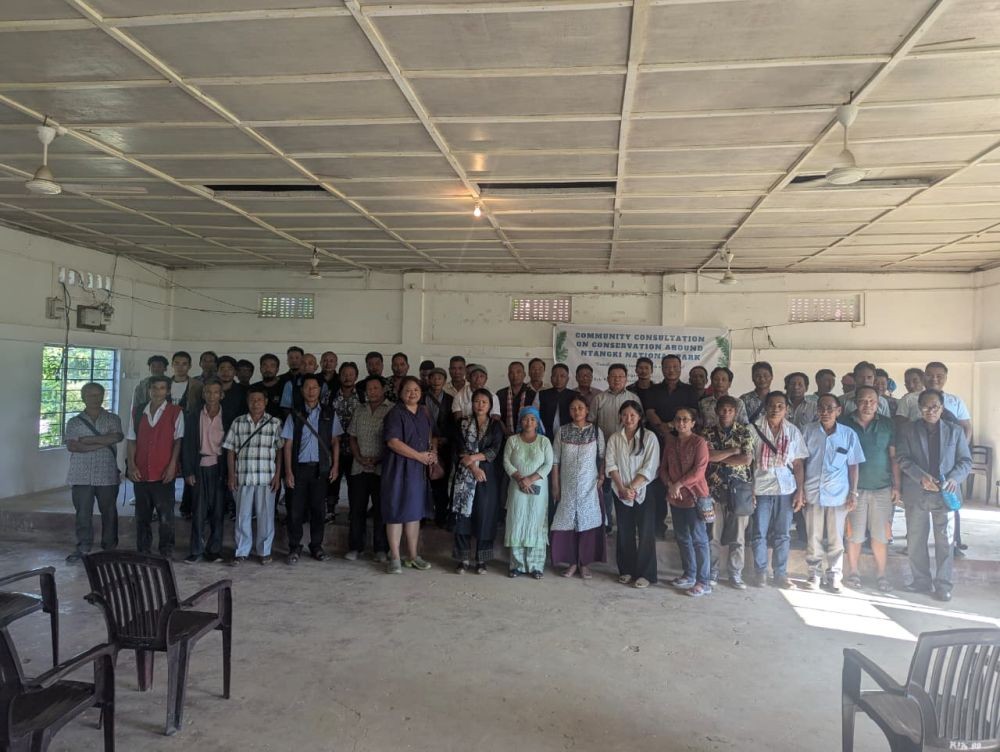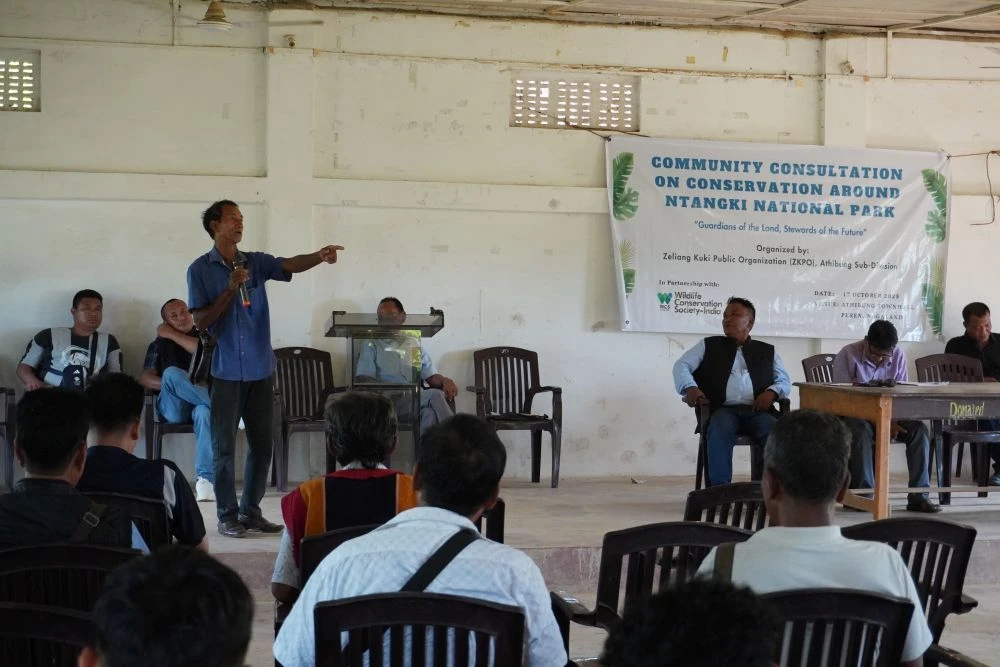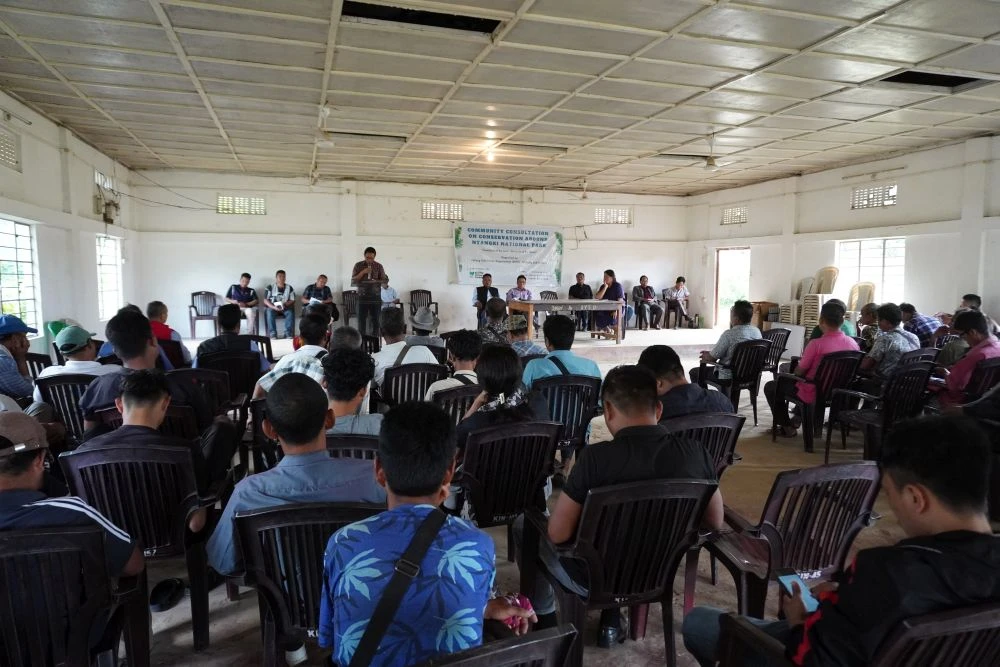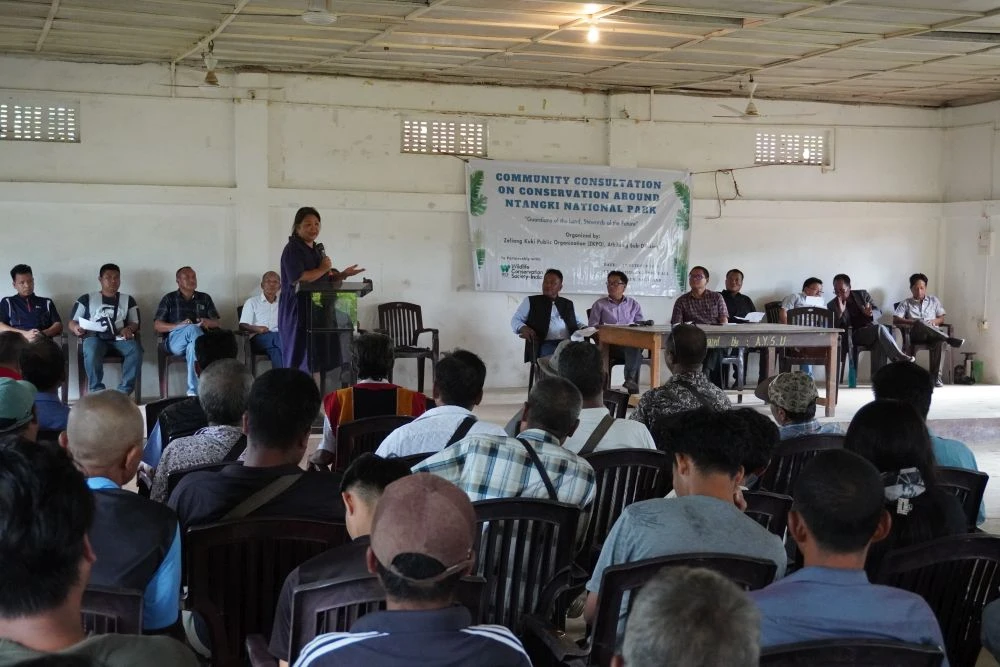Participants from 37 villages, along with members of the Zeliang-Kuki Public Organisation, Nagaland Zeliang People’s Organisation, Kuki Inpi, WCS-India and others, at a consultation meeting in Athibung on October 17.

Imti Longchar
Athibung | October 19
In a landmark step toward strengthening community-led conservation, representatives from 37 villages under Athibung sub-division, Peren district, on October 17 adopted a set of resolutions to protect and preserve the Ntangki National Park.
The meeting was organised by the Zeliang-Kuki Public Organisation (ZKPO), Athibung sub-division, and marked a significant and first-of-its-kind gathering to deliberate on wildlife conservation, hunting, fishing, logging, and the collective way forward to address these issues.
The meeting was attended by Gaonburas, chairpersons, and representatives from 37 villages, including youth and women leaders, members of the Kuki Inpi, Nagaland Zeliang People’s Organisation (NZPO), Zeliang-Kuki Public Organisation and others.
Resolutions adopted
A series of resolutions was unanimously adopted to protect Ntangki National Park. The house agreed to strictly enforce customary laws against violators involved in timber logging, fishing, and hunting inside the park. It also resolved to ban the use of inverters and batteries for fishing, poisoning of rivers within Athibung sub-division and to empower Village Councils to implement decisions on wildlife hunting within their respective jurisdictions.
The meeting further agreed to extend full support to the Forest Department in its ongoing efforts to safeguard Ntangki National Park, which remains one of Nagaland’s most important wildlife habitats.
Winter hunting pressures
The consultation came at a time when the arrival of winter often marks the beginning of increased hunting activity across Nagaland.
Athibung and adjoining areas on the periphery of Ntangki National Park have long gained a reputation as hotspots during this season, with both outsiders and local villagers reportedly making a beeline for the forest. There have been recurring accounts of baskets filled with birds and wild animals being loaded onto trucks and transported out of the area, a practice that has drawn serious concern.

‘Our stories will die if the forests die’
Addressing the gathering, Bano Haralu, Project Lead of the Nagaland Rights and Communities Team at WCS–India, called on the people to stand united for conservation. Reflecting on her journey from Dimapur to Athibung, she said she did not hear “even the chirping of a single bird,” describing it as a painful reminder of the consequences of rampant hunting.
She reminded the gathering that with the disappearance of wildlife and forest cover, Naga culture and identity would also fade. “Our folklore, songs, and dances are intertwined with the landscape. If the forests and animals vanish, our stories will vanish too,” she said.
Haralu also warned that if the current destruction of nature continues, Nagaland’s status as a global biodiversity hotspot could be lost.
She urged the people of Peren district, especially those in Athibung sub-division, to take greater responsibility as the park falls within their care.
Emphasising the connection between humans, animals, and forests, she said, “Humans cannot survive without the forest. If the animals and birds disappear, even the jungle will disappear one day.”
She further stressed that conservation cannot be achieved by one village alone. “All the villages must stand together in unity. This is the time to decide and stand united to make it work,” she appealed.

‘Conservation must start from the village’
Also speaking at the meeting, T. Sulanthung, SDO (Civil) of Athibung sub-division, urged the gathering to take conservation seriously. “If we do not take up conservation now, there will be nothing left to conserve in the future,” he said.
He pointed out that in many parts of the world, people are willing to conserve but have no forest cover left to protect. Expressing concern at the ongoing destruction of forests in Peren, he remarked, “In my lifetime, I have seen big trees only in Peren, but unfortunately, those were seen only on trucks and not standing.”
He also lamented that there were few positive stories coming out of Peren district, most of them instead being about logging and hunting.
“Nagas, being a tribal people, have our folklores, dances, and stories rooted in the forests and animals since we are closely intertwined with nature. That is why we must give greater importance to conservation. We sing songs of hornbills, but they are no longer there,” he said.
Stating that conservation should begin from the village councils and not depend solely on the state government, he suggested that the villagers form a joint council committee or a similar body to conserve and protect Ntangki National Park. “Until and unless village councils go and implement it in their villages, the directives or orders from the district administration will not work,” he maintained.

‘Stop inviting outsiders to hunt for money and alcohol’
In his address, NZPO President Zandi Domta called upon village councils to do away with the mentality of killing wildlife for sale or inviting outsiders from Dimapur or Kohima to hunt in their areas in exchange for money, bullets, or alcohol.
Iheilung informed that the NZPO had already passed a resolution banning hunting, fishing, and the establishment of new villages. “We are trying our best to make Peren a green district and to afford protection to Ntangki National Park,” he said.
He also revealed that the NZPO had submitted a proposal to the State Forest Minister for a proper verification of the Ntangki area along with tribal hohos, forest department officials, and landowners to ensure protection of the park’s boundaries.
The General Secretary of Kuki Inpi, Lulun Khulhou who also spoke at the meeting, appealed to village councils and Gaonburas to take ownership of efforts to preserve Ntangki National Park. The meeting concluded with an open discussion on the way forward, where participants actively shared ideas on how to strengthen enforcement and build community-led conservation initiatives.
The ZKPO, meanwhile, stated that they plan to engage further with the Forest Department to strengthen this partnership in conservation.
The 37 villages are Phanjang, Saijang,Bonkollong, Songngou, Besumpuipuiloa, Lilen, New Chalkot, New Soget, Bunglen, New Besumpui, L.Lilen, Inbung, Old Soget, New Ngaulong, Besumpuiram, ’B’-Lilen, Chalkot, Sailhem, New Nkio, Old Besumpui, Phaijo, Athibung, Sinjol, Nkio B, Nkio Lodi, Vongkithem, Sangluh, Khelma, Ikiesingram, Besumpui Zangdi, Chamcha New, Pellhang, Gopibung, Nsenlo and Beisumlwa.






